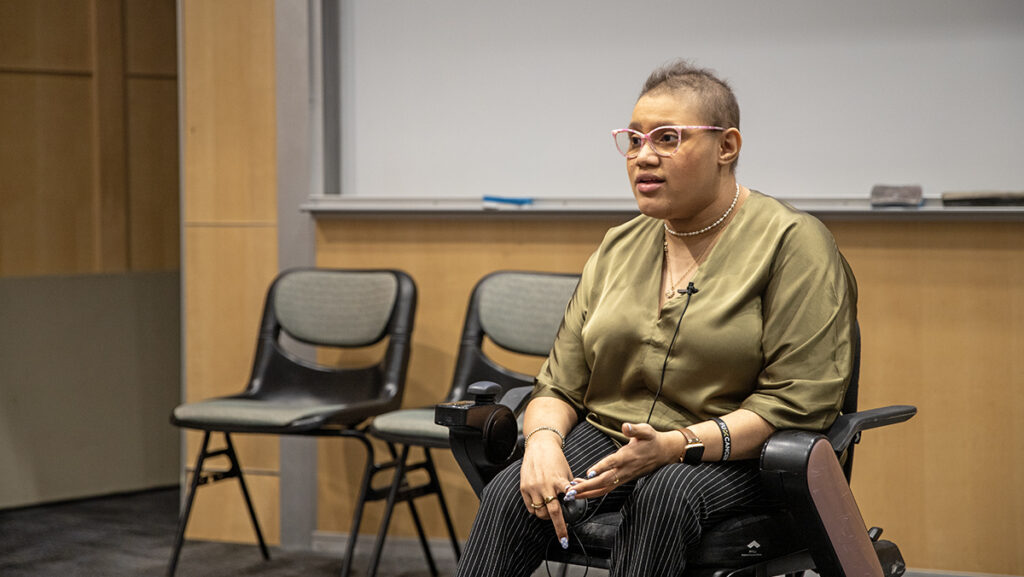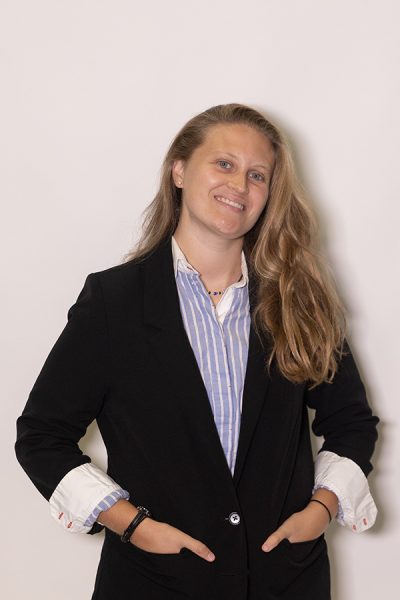At 7 p.m. April 20 in Textor 102, Daphne Frias, a youth activist who focuses on the intersectionality of climate change and disability, spoke as a keynote speaker during Ithaca College’s Sustainability Week about the necessity of social media to influence people to care and educate themselves about the climate crisis.
Frias opened the event by stating that young people can influence aspects of society — like the government, economy and infrastructure — if they post facts about the climate crisis on social media and simultaneously vote for their beliefs.
“I think that social media gives us the ability to really harness the key attributes of what I believe makes Gen Z a powerful force for change,” Frias said. “Gen Z has the ability to connect across continents and countries, [by] reaching across languages, races and ethnicities.”
Frias also addressed the negative parts of being on social media, like doom scrolling and being influenced by false claims on the internet.
“There’s a lot of endless hours of time where we should be sleeping and we’re scrolling on Instagram and Twitter,” Frias said. “Yes, those are all parts of the habits that come along with social media, but there are also amazing things that come along with the power of social media.”
Frias said she began an organization called Box the Ballot, which uses social media to contact young voters to cast their ballot, especially college students in the process of mailing an absentee ballot. Frias said her team does not try to sway these young voters to vote for either political party and instead promotes the importance and necessity of voting in a democracy. Frias said she was inspired to create the organization when she was a sophomore in college and was unsure of how to receive her absentee ballot.
“There were so many other young people out there who probably weren’t getting their ballots casted on time simply because they just didn’t know how to use the system properly,” Frias said. “And this made me think about how many votes were missing, to actually represent the American public and the things that you want to see our country move towards.”
Frias spoke about other interactions she has had with activism and social media, like working with Greta Thunberg for Fridays for Future, an international climate movement Thunberg began when she was 15.
“They find common ground and the ability to want to protect our planet,” Frias said. “I think that is what is so powerful about sustainability and climate justice as a whole. Because at the end of the day, regardless of how you identify, we all live on this one planet.”
Between 15% to 20% of the global population are people with disabilities and have many reasons to have an interest in the climate crisis, according to Forbes. Frias said organizations that do not include people with disabilities are not doing enough.
“I would say that all justice is disability justice,” Frias said. “And if you’re not including disabled folks in your justice making, you are not fighting for equitable justice.”
Frias is a part of the disabled community and has cerebral palsy. Frias said that people with disabilities are especially harmed by climate change, like changing weather patterns, plastic straw bans and extreme heat. She said changes in weather make it hard for people like her who cannot perspire to regulate their body temperature when an area is affected by extreme heat waves. Frias also said plastic straws are a way for people to survive and banning them would be harmful to some people with disabilities.
“There are so many disabled folks, myself included, who depend on the stability and flexibility of single-use plastic,” Frias said. “The material of single-use plastic as well is less susceptible to contamination by other sources.”
Senior Austin Ruffino is the webmaster for Sustainability Week. He created the website for the week and said it was exciting to work as a part of the committee. He said that Sustainability Week originally was started in 2016 by Christine Bataille, associate professor and chair in the Department of Management, when she began the week of education for a class project but stopped when the COVID-19 pandemic hit. He said this is the first year that the events have been fully brought back.
“We are diving in,” Ruffino said. “It’s great to meet all these people and explore Ithaca and all the connections we have to sustainability. It’s been great to relaunch this rebirth of the week.”
Senior Kaitlyn Pocze served on the Sustainability Week Committee as a marketer. She said that much of what Frias talked about in her keynote speech was inspirational and taught everyone how she has been a person with a disability being an activist for the climate initiative. Arielle V. King, director of Programming at Black Girl Environmentalist, was the other keynote speaker who spoke at 7 p.m. April 19 in Textor 102.
“It was such an honor to hear what she had to say,” Pocze said. “Being an activist, she talked a lot about what she’s done, but she also said a lot about how she overcame the challenges in her life. I definitely have to say I learned a lot from her.”
Ruffino said the committee has been planning the event with Frias for months and that everyone can learn something from Frias.
“Obviously she’s not afraid to speak her mind and tell us what’s happening in the world and she’s not afraid to stand up for what she believes in,” Ruffino said. “I think what she has to say is something we can all use to learn something.”
Frias said despite not seeing the fruits of their labor, activists and young people should still work hard to help the Earth in any way they can, so that the generations of the future can live under similar, or better, circumstances than those living now.
“It is worth it because the future that we’re fighting for is the future full of people that we can love,” Frias said. “It is a planet full of amazing wonder. The amazing Finger Lakes that are right outside of our door. We have the responsibility as humans to have a symbiotic relationship with our planet.”









